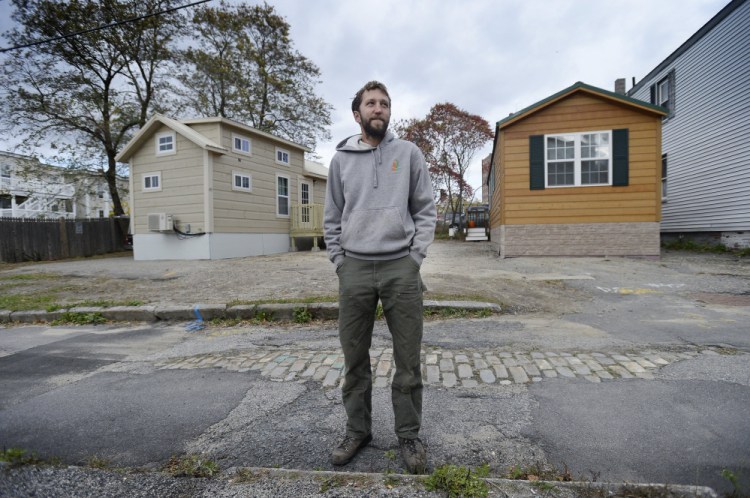The city of Portland is suing a man who placed two tiny houses in a parking lot last fall with the intent of renting them out.
Brent Adler, who owns the small Bayside neighborhood lot, says the units are actually recreational vehicles, not structures, because they are on trailers with wheels. However, city officials contend they are illegally built houses and want them removed.
Now the city is asking a District Court judge to order the removal of the homes and to levy a fine against Adler, who declined to comment Tuesday night. The lawsuit, which was provided at the request of the Portland Press Herald, was filed Tuesday.
“We are always willing to work collaboratively to find a suitable solution,” City Hall Communications Director Jessica Grondin said in an email. “Prior to filing suit, the city worked hard to achieve voluntary compliance, but ultimately the defendant was not interested in cooperating and we had no choice but to file a complaint.”
Tiny homes have popped up around the country and in other Maine communities, sometimes raising questions about whether they should be subject to the same rules as traditional homes. This is the first time Maine’s largest city has had to tackle zoning issues around the growing movement toward smaller living spaces. The Portland City Council’s Housing Committee briefly took up the issue in October and concluded that tiny homes do not comply with the state’s building code and certification for manufactured homes, according to meeting minutes.
Nathaniel Huckel-Bauer, who is representing Adler’s Federal Street Phoenix LLC, is disappointed that the city could not reach an agreement with his client. He said the case highlights the need to change Portland’s ordinances and the state building codes to be more accommodating to tiny houses and so-called micro-apartments – units generally less than 300 square feet. Both could help ease the housing shortage, he said.
“Part of the city’s position, that a property owner in Portland cannot keep a recreational vehicle trailer on their lot, should be a concern to all Portland residents that keep an RV in their side yard, especially if visiting relatives ever use it as a guest house,” Huckel-Bauer said in an email. “Enabling the development of tiny houses may also help attract millennials and other people interested in a more sustainable lifestyle, which I believe is an important goal for the city and the state as a whole.”
The city first ordered Adler to remove the two homes at 47 and 49 Chapel St. in October. Adler had 30 days to appeal the violation notice, but he did not do so.
Instead, he sought to clarify his position. In a letter dated Oct. 31, Adler said each of the roughly 400-square-foot units has a title, a vehicle identification number and a registration, “which is sufficient evidence to show they are vehicles.” As such, they could be used for “temporary living quarters,” which do not need to meet the city’s building codes, he said.
“At this time, neither vehicle is occupied,” Adler wrote. “However, the right to occupy these vehicles does not fall under the jurisdiction of the City of Portland Code of Ordinances and these vehicles may be occupied in the future as temporary living quarters.”
The city is asking the District Court judge to order the removal of the homes and levy a minimum penalty of $100 per violation per day beginning last Oct. 12, as well as reimbursement of costs and fees to the city. City officials did not want to speculate on what the total fine might be.
The lawsuit alleges six ordinance and code violations, including moving a building without a permit, failure to receive an occupancy permit, failure to register rental units with the city, and having rental units that do not comply with the International Residential Code regarding foundations.
The city also alleges that the site has been formally listed as “vacant land” since a duplex there was destroyed by fire in 1974. Any change of that status would require a change of use permit from the city, which was neither sought nor issued.
The city believes one of the homes is occupied, but Adler denies that claim.
Adler bought the property in March 2016 for $100,000, according to city tax records. He approached the city about building a multi-unit apartment building on the lot. But last fall he said he would have been forced to upgrade the public road leading into the site, which made the project too costly.
Instead, Adler installed electrical, sewer and water service to the 1,800-square-foot lot. That work was fully permitted by the city. He later installed the two homes on wheels, which he said cost him $175,000.
In October, Adler said one prospective tenant was willing to pay $1,100 a month for a 400-square-foot unit at 47 Chapel St., which has a small kitchenette, living room, bathroom with a stand-up shower and a bedroom with a queen-size bed. Built in Lebanon, Maine, the unit has handmade pine cabinets and wood laminate flooring.
A 380-square-foot unit at 49 Chapel St., which had a fold-down Murphy bed in the wall of the living room, would have been rented for $850 a month, he said at the time.
Grondin denied the allegation that Portland was not amenable to tiny homes.
“Our enforcement of this issue is not about tiny homes, it is about public safety. Tiny homes are allowed in Portland when built according to state building codes,” Grondin said. “In this case, Mr. Adler is someone that we were working with on plans for this site, and after hearing our guidance, he ignored it and went ahead without seeking further approval.”
Randy Billings can be contacted at 791-6346 or at:
Send questions/comments to the editors.





